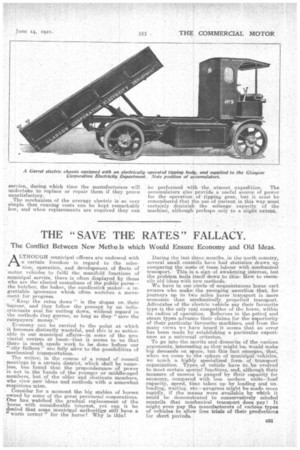• THE "SAVE THE RATES" FALLACY.
Page 31

If you've noticed an error in this article please click here to report it so we can fix it.
The Conflict Between New Methols which Would Ensure Economy and Old Ideas.
ALTHOUGH municipal officers are endowed with , a certain freedom in regard to the selec, ton, operation, and development of fleets of motor vehicles to fulfil thee manifold functions of municipal service, there is often displayed by those who are the erected custodians of the public purse— the butcher, the baker, the candlestick maker—a regrettable ignorance whiole often seotches a movement for progress.
" Keep the rates down " is the slogan em their banner, and they follow the precept by an indiscriminate zeal for cutting down, without regard to the methods they pursue, so long as they "save the ratepayers' money. '
Economy can be carried to the point at which it becomes distinctly wasteful, and this is so noticeable in our municipal affairs—in some of the provincial centres at least—that it seems to us that there is much spade work to be done before our "city fathers " are fully alive to the possibilities of mechanical transportation.
The writer; in the course of a round of council meetings in a certain district, which shall be nameless, has found that the preponderance of power is not in the hands ofthe younger or middle-aged members, but of the older and obstinate members, who view new ideas and methods with a somewhat suspicious mien.
Consider for a moment the big stables of horses owned by some of the great provincial corporations. One has watched the gradual replacement of the horse with considerable inteyest, yet can it be denied that some municipel authorites still have a "warm corner" for the horse? Why is this? During the last three months, in the north country, several small councils have had statistics drawn up comparing the costs of team labour with mechanical transport. This is a-sign of awakening interest, but the problem boils itself down to this: How to reconcile old ideas with new methods.
We have in our circle of acquaintances horse cart owners who make the sweeping assertion that, for Journeys up to two miles horse transport is more economic than mechanically propelled transport. Advocates of the electric vehicle say their favourite type is the only real competitor of the horse, within its radius of operation. Believers in the petrol and steam types advance their claims for the superiority of their particular favourite machines, and from the many views we have heard it seems that an error has been made by establishing a particular experi
ence as a universal criterion. ,
To go into the merits and demerits of the various arguments, interesting as they might be, would make big demands on space, but this fact emerges, that, when we come to the sphere of municipal veliieles, we touch a highly specialized form of transport organization. Types of vehicle have to. be evolved to meet certain special functions, and, although their measure of success is gauged by their capacity for economy, compared with less modern mute—load capacity, speed, time taken up by loading and unloading, waiting, eto.—progress might be made more rapidly. if the means were .available by which it could be demonstrated to conservatively minded councils that mechanical transport does pay! It might even pay the manufacturers of various types of vehicles to allow free trials of their productions for short periods.






































